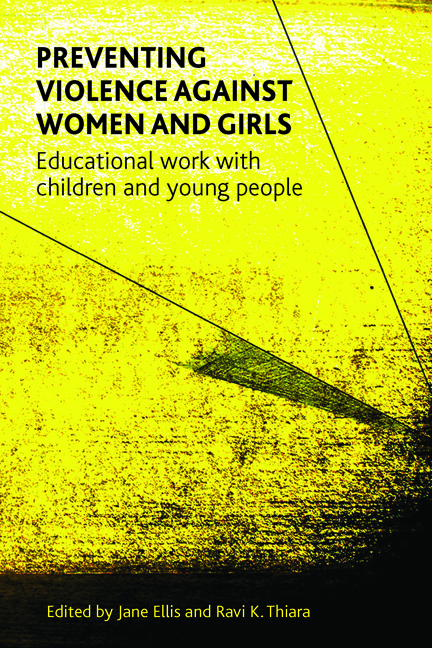Book contents
- Frontmatter
- Dedication
- Contents
- List of tables and figures
- Notes on contributors
- Acknowledgements
- Foreword
- Introduction
- one Preventing violence against women and girls through education: dilemmas and challenges
- two Does gender matter in violence prevention programmes?
- three Responding to sexual violence in girls’ intimate relationships: the role of schools
- four ‘Pandora’s Box’: preventing violence against black and minority ethnic women and girls
- five Preventing violence against women and girls: a whole school approach
- six What did you learn at school today? Education for prevention
- seven No silent witnesses: strategies in schools to empower and support disclosure
- eight Preventing sexual violence: the role of the voluntary sector
- nine ‘Boys think girls are toys’: sexual exploitation and young people
- ten MsUnderstood: the benefits of engaging young women in antiviolence work
- eleven Shifting Boundaries: lessons on relationships for students in middle school
- Concluding remarks
- Appendix: Examples of programmes in the UK
- Index
five - Preventing violence against women and girls: a whole school approach
Published online by Cambridge University Press: 04 March 2022
- Frontmatter
- Dedication
- Contents
- List of tables and figures
- Notes on contributors
- Acknowledgements
- Foreword
- Introduction
- one Preventing violence against women and girls through education: dilemmas and challenges
- two Does gender matter in violence prevention programmes?
- three Responding to sexual violence in girls’ intimate relationships: the role of schools
- four ‘Pandora’s Box’: preventing violence against black and minority ethnic women and girls
- five Preventing violence against women and girls: a whole school approach
- six What did you learn at school today? Education for prevention
- seven No silent witnesses: strategies in schools to empower and support disclosure
- eight Preventing sexual violence: the role of the voluntary sector
- nine ‘Boys think girls are toys’: sexual exploitation and young people
- ten MsUnderstood: the benefits of engaging young women in antiviolence work
- eleven Shifting Boundaries: lessons on relationships for students in middle school
- Concluding remarks
- Appendix: Examples of programmes in the UK
- Index
Summary
Activists, agencies and practitioners in the field of violence against women and girls (VAWG) understand VAWG to be both the consequence and continued cause of unequal relations between men and women. For instance, as an organisation, UN Women states that it works on several fronts to end VAWG, including tackling ‘its main root: gender inequality’. Yodanis (2004) calls this the ‘feminist theory’ (p 656) position on VAWG, and goes on to suggest that ‘the educational and occupational status of women in a country is related to the prevalence of sexual violence against women’ (p 655). Other writers emphasise that VAWG is legitimated by and contributes to the production and reproduction of a wider set of gender and sexual inequalities (Messerschmidt, 2000; Phipps, 2009; Powell, 2010).
While much research on gender-related violence and its effects has taken place in Southern countries (Garcia-Moreno et al, 2006; WHO/LSHTM, 2010; Parkes and Heslop, 2011), this chapter is concerned with the prevention of VAWG in English and Welsh schools. It questions the extent to which current programmes take as their starting assumption the argument made by many feminists that tackling gender inequality lies at the heart of reducing VAWG. It then discusses the notion of a ‘whole school approach’ and emphasises its importance for VAWG prevention. Drawing on Pierre Bourdieu's concepts of habitus and field, the chapter explores ways in which the school space (or at least spaces within the school) can be used to challenge and change (if not transform) those power relations which facilitate VAWG in all its forms. By drawing on examples of actions developed in schools we have worked in in England and Wales, to prevent VAWG,2 we argue for the usefulness of Bourdieu's theoretical framework for developing a whole school approach.
VAWG prevention programmes – the question of gender
Over the last 20 years, many school programmes in this area of work have sought to raise awareness of the issue of ‘dating violence’ (a common focus of programmes in North America – see, for example, the ‘Safe Dates Program’ in North Carolina), domestic violence (such as the London-based Westminster Domestic Violence Forum's Domestic Violence Prevention Pack for Schools), and respectful and/or healthy relationships between young people (such as SafePlace's ‘Expect Respect Program’ in Austin, Texas or Women's Aid England ‘Expect Respect’ Education Toolkit).
- Type
- Chapter
- Information
- Preventing Violence against Women and GirlsEducational Work with Children and Young People, pp. 103 - 120Publisher: Bristol University PressPrint publication year: 2014
- 1
- Cited by



